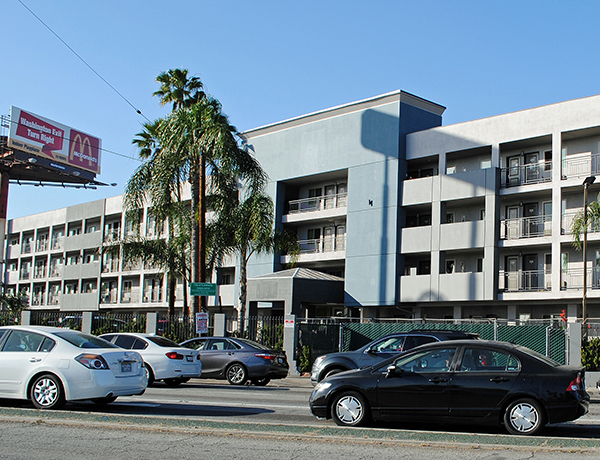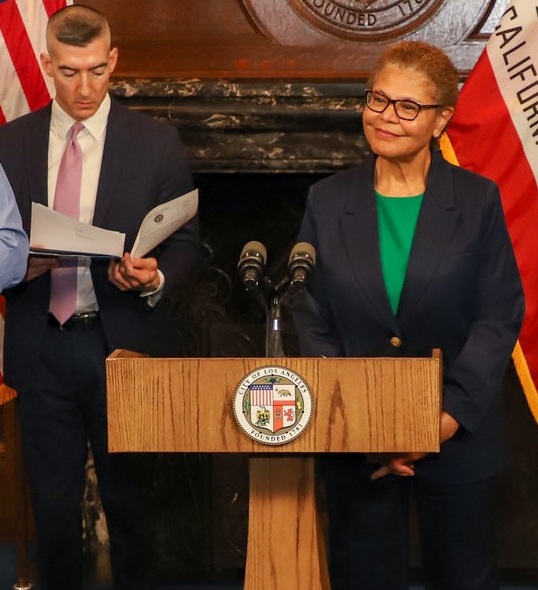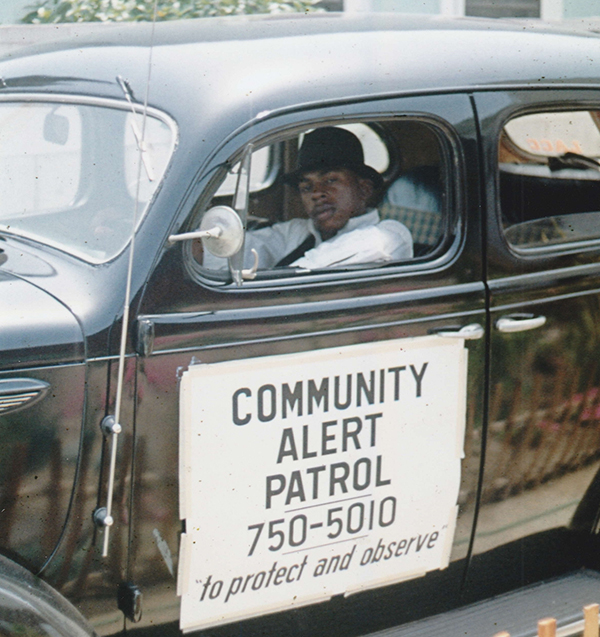By Alfredo Santana
Contributing Writer
COMMERCE — A former motel that fell victim to the economic slowdown inflicted by COVID-19 has been purchased by Los Angeles County and turned into permanent housing for the homeless under the state’s Project Homekey.
The motel currently has 47 of its 81 units occupied.
Formerly known as the Studio 6 motel, the facility was purchased for $14.95 million last December with state and federal money from the CARES Act, funds earmarked to help state and local governments provide assistance to residents in need and devise programs that combat the effects of the pandemic.
“The project is not vacant,” said Alicia Murillo, a communications analyst for the California Housing and Community Development Department. “They have confirmed that they do have 50% occupancy of their units.” Murillo said the unoccupied units are being worked on so they conform with requirements of the Americans with Disabilities Act along with other improvements.
An employee of Los Angeles County who asked to remain anonymous said that nine of the units required new kitchens and the facility would be fully operational later this year as soon as work to make rooms accessible for disabled tenants is completed.
When the state’s Housing and Community Development Department announced last fall the allocation of $11.75 million for the purchase, it stated that residents would be able to move in by spring 2021.
“The facility has been operational at least a month, maybe longer,” the county employee said.
Asked why the main entrance was closed with a wire mesh fence and a green tarp to block sight from the street, the county employee said that since the building used to be a motel, the gate stops unaware customers from driving into the premises.
The four-story building is under the management of the county’s Department of Health Services and the Los Angeles Homeless Services Authority and provides meals, health services and other supportive services to residents who once were homeless.
The gray-façade structure stands between the southbound lanes of the Santa Ana (5) Freeway and an Arco AM-PM gas station along the busy corridor.
Dr. Heidi Behforouz, medical director of housing for health with the LA County Department of Health Services, said Project Homekey is a positive step toward fighting homelessness.
“People who are there may expect to have their own apartment, their own little piece of what they deserve indefinitely,” Behforouz said. “Now that we moved to vaccines, there is trust. Housing is a social justice issue.”
The former motel “will be converted to permanent housing with supportive services for people experiencing homelessness and affected by COVID-19,” stated the Housing and Community Development Department in a letter released last October.
Usually, multi-dwelling buildings built after 1991 that receive federal assisted housing funds are required to equip 5% of the total units with accessible entries and infrastructure for people in wheelchairs or other mobility issues.
According to the website Urbanize Los Angeles, “construction of the motel was finished in the late 1980s.”
Project Homekey is similar to Project Roomkey, the temporary emergency plan ushered by Gov. Gavi Newsom at the onset of the pandemic to house vulnerable residents who sought shelter against street contagions and wanted a place to ride out the pandemic, quarantine or to recover from the disease.
Data obtained from Los Angeles Homeless Services Authority website indicated that as of June 1, only one resident occupied a unit under Project Roomkey in the region, and there were 2,388 rooms available on 17 sites. Last year, Roomkey provided more than 10,000 people with temporary shelter in the county, and 850 transitioned to permanent housing.
The agency said that 207 people leave homelessness a day, but also 227 become indigent, statistics that fail to tame the flow of the homeless crisis in Los Angeles County.
More than 64,000 people moved into housing in the last three years. However, the last homeless count across the county conducted in January 2020 found that 66,000 residents slept on the streets.
To launch Project Homekey, the county received $108 million from the state to purchase 10 hotels, motels or apartment buildings, aiming to restore them for interim or permanent housing for the homeless and build a portfolio of real estate properties to ease homelessness in the region.
Of the $600 million the California Department of Housing and Community Development funneled to city, counties and tribal entities last year, $550 million had to be expended on Dec.30, 2020, and $50 million from the state’s general fund should close escrow by June 30, 2022.
In addition to the Commerce site, two more county facilities opened in Compton, two in Long Beach, and one in Norwalk, Baldwin Park, Whittier, Hacienda Heights and Harbor City.
The cities of Los Angeles, Burbank and Long Beach also received additional funds under the same program, along with the Los Angeles County Housing Authority.
The county expects to provide 847 units with its current Project Homekey properties.
In his 2021-22 budget proposal, Newsom added $750 million for additional purchases of distressed properties fit for Project Homekey, without the tight deadlines local governments had to finish escrows.
Even though the Studio 6 motel was not part of Project Roomkey, the previous operator rented units to families and individuals with housing needs for up to a month to stay afloat during the pandemic.
In order to close escrow, former owner Anmol LLC evicted all tenants and turned the motel over to the county without occupants.
The sale of the Studio 6 motel pitted the kicked out renters against the former owner and the county. The former tenants hired lawyers and obtained assistance from community organizations, and threatened to sue both parties unless similar shelter was soon provided. A coordinated outreach effort from public housing agencies and nonprofits resolved the temporary homeless crisis.
“We didn’t have to build these buildings,” said Phil Ansell, director of the county Homeless Initiative, in January. “We were able to purchase these properties, the land and the buildings, and immediately began using these properties to provide shelter.”
The governor has proposed another $12 billion from the state’s economic surplus to combat homelessness in the next fiscal year starting in July, although he did not detail how he would use the funds if they are approved by the state Legislature.
Various housing agencies estimate that under Project Homekey each unit bought from ailing motels and hotels costs an average of $210,000 to renovate, whereas newly built apartments are twice as expensive.
Alfredo Santana is a freelance reporter for Wave Newspapers who covers the Southeast Los Angeles County area. He can be reached at alfredo68j@hotmail.com.











